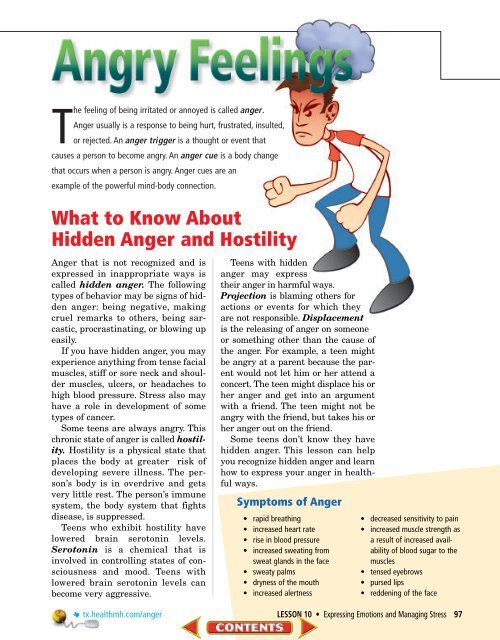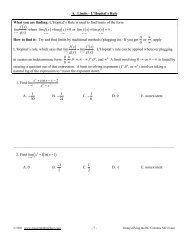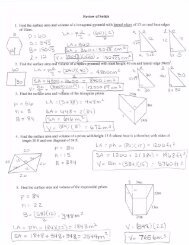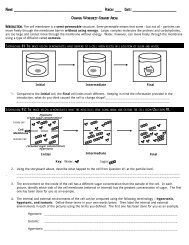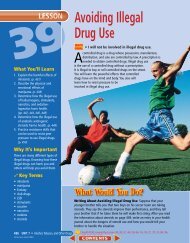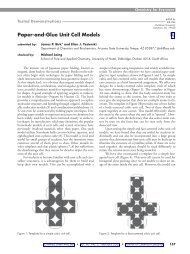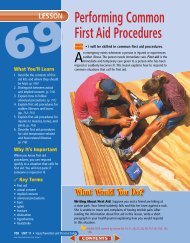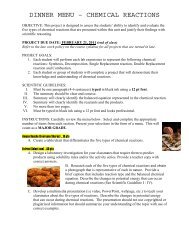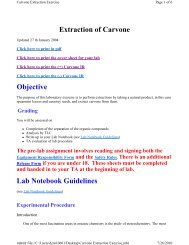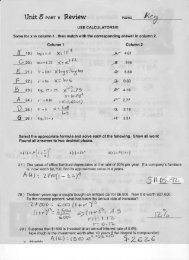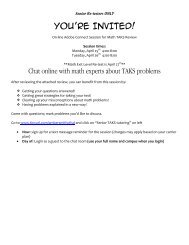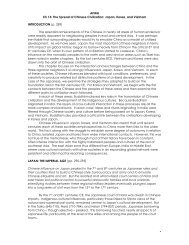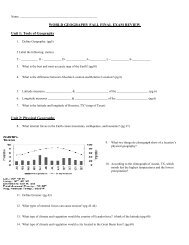Lesson 10 Expressing Emotions and Managing Stress - Epsilen
Lesson 10 Expressing Emotions and Managing Stress - Epsilen
Lesson 10 Expressing Emotions and Managing Stress - Epsilen
You also want an ePaper? Increase the reach of your titles
YUMPU automatically turns print PDFs into web optimized ePapers that Google loves.
The feeling of being irritated or annoyed is called anger.<br />
Anger usually is a response to being hurt, frustrated, insulted,<br />
or rejected. An anger trigger is a thought or event that<br />
causes a person to become angry. An anger cue is a body change<br />
that occurs when a person is angry. Anger cues are an<br />
example of the powerful mind-body connection.<br />
What to Know About<br />
Hidden Anger <strong>and</strong> Hostility<br />
Anger that is not recognized <strong>and</strong> is<br />
expressed in inappropriate ways is<br />
called hidden anger. The following<br />
types of behavior may be signs of hidden<br />
anger: being negative, making<br />
cruel remarks to others, being sarcastic,<br />
procrastinating, or blowing up<br />
easily.<br />
If you have hidden anger, you may<br />
experience anything from tense facial<br />
muscles, stiff or sore neck <strong>and</strong> shoulder<br />
muscles, ulcers, or headaches to<br />
high blood pressure. <strong>Stress</strong> also may<br />
have a role in development of some<br />
types of cancer.<br />
Some teens are always angry. This<br />
chronic state of anger is called hostility.<br />
Hostility is a physical state that<br />
places the body at greater risk of<br />
developing severe illness. The person’s<br />
body is in overdrive <strong>and</strong> gets<br />
very little rest. The person’s immune<br />
system, the body system that fights<br />
disease, is suppressed.<br />
Teens who exhibit hostility have<br />
lowered brain serotonin levels.<br />
Serotonin is a chemical that is<br />
involved in controlling states of consciousness<br />
<strong>and</strong> mood. Teens with<br />
lowered brain serotonin levels can<br />
become very aggressive.<br />
tx.healthmh.com/anger<br />
Teens with hidden<br />
anger may express<br />
their anger in harmful ways.<br />
Projection is blaming others for<br />
actions or events for which they<br />
are not responsible. Displacement<br />
is the releasing of anger on someone<br />
or something other than the cause of<br />
the anger. For example, a teen might<br />
be angry at a parent because the parent<br />
would not let him or her attend a<br />
concert. The teen might displace his or<br />
her anger <strong>and</strong> get into an argument<br />
with a friend. The teen might not be<br />
angry with the friend, but takes his or<br />
her anger out on the friend.<br />
Some teens don’t know they have<br />
hidden anger. This lesson can help<br />
you recognize hidden anger <strong>and</strong> learn<br />
how to express your anger in healthful<br />
ways.<br />
Symptoms of Anger<br />
• rapid breathing<br />
• increased heart rate<br />
• rise in blood pressure<br />
• increased sweating from<br />
sweat gl<strong>and</strong>s in the face<br />
• sweaty palms<br />
• dryness of the mouth<br />
• increased alertness<br />
• decreased sensitivity to pain<br />
• increased muscle strength as<br />
a result of increased availability<br />
of blood sugar to the<br />
muscles<br />
• tensed eyebrows<br />
• pursed lips<br />
• reddening of the face<br />
LESSON <strong>10</strong> • <strong>Expressing</strong> <strong>Emotions</strong> <strong>and</strong> <strong>Managing</strong> <strong>Stress</strong> 97


